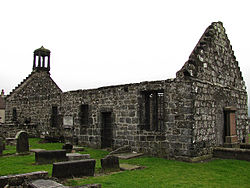Tullibody Old Kirk
| Tullibody Old Kirk | |
|---|---|
 Tullibody Old Kirk | |
| Location | Menstrie Road, Tullibody, Clackmannanshire |
| Built | 12th century |
Listed Building – Category A | |
| Official name | Tullibody Old Kirk |
| Designated | 9 June 1960 |
| Reference no. | 1972 |
| Official name | Tullibody, old parish church |
| Designated | 18 September 1936 |
| Reference no. | 626 |
Tullibody Old Kirk is a ruined 12th-century church in Tullibody, Clackmannanshire, Scotland. It was rebuilt in the 16th century, and restored again in 1760. The roofless building is protected as a Category A listed building,[1] and a Scheduled Ancient Monument.[2] In 1904, St Serf's Parish Church was built to the north of the Old Kirk, which was afterwards disused.
The church measures 19 by 6.7 metres (62 by 22 ft). The bellcote on the western gable dates from 1772, while the western windows and the south porch are 19th-century additions. Two doorways survive from the 16th century, including one dated 1539.
Monuments
Significant monuments include that of George Abercromby (d.1699), and the Haig memorial on the north wall. The surrounding burial ground is a Category B listed building.[3]
During the Scottish Reformation, William Kirkcaldy destroyed the bridge at Tullibody in an attempt to prevent French troops from retreating to the Siege of Leith at the end of January 1560. However, the French removed the roof of Tullibody Kirk and used it to bridge the Devon.[4]
References
- ^ "Tullibody Old Kirk, Listed Building Report". Historic Scotland. Retrieved 2010-05-10.
{{cite web}}: Cite has empty unknown parameter:|coauthors=(help) - ^ "Certificate of Service of Notice... Tullibody Old Parish Kirk". Historic Scotland. 18 September 1936.
{{cite web}}: CS1 maint: year (link) - ^ "Tullibody Old Kirkyard, Listed Building Report". Historic Scotland. Retrieved 2010-05-10.
{{cite web}}: Cite has empty unknown parameter:|coauthors=(help) - ^ Laing, David, ed., 'John Knox's 'History of the Reformation', Book 3,' The Works of John Knox, vol. 2, Bannatyne Club, Edinburgh (1848), p. 14

